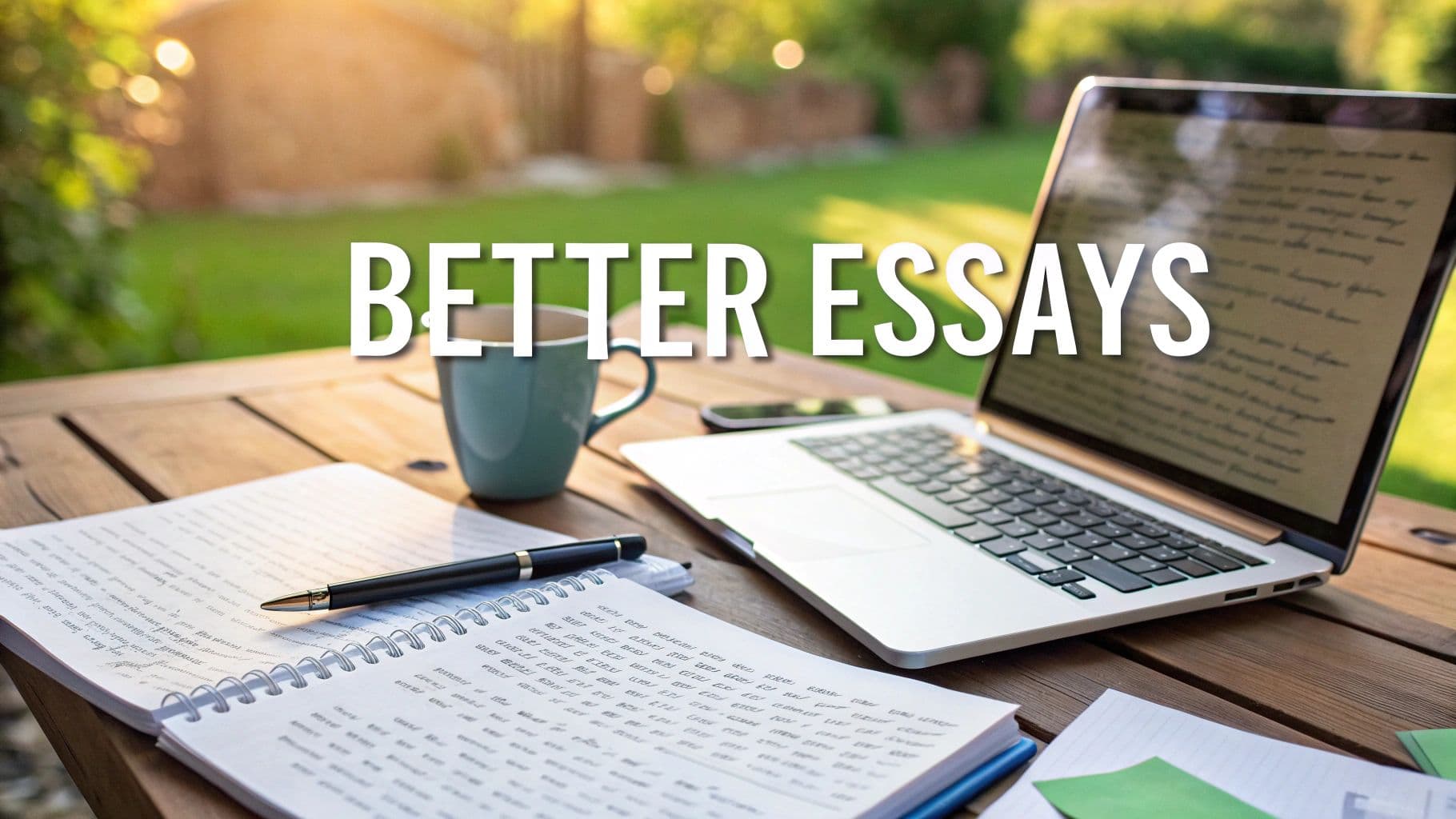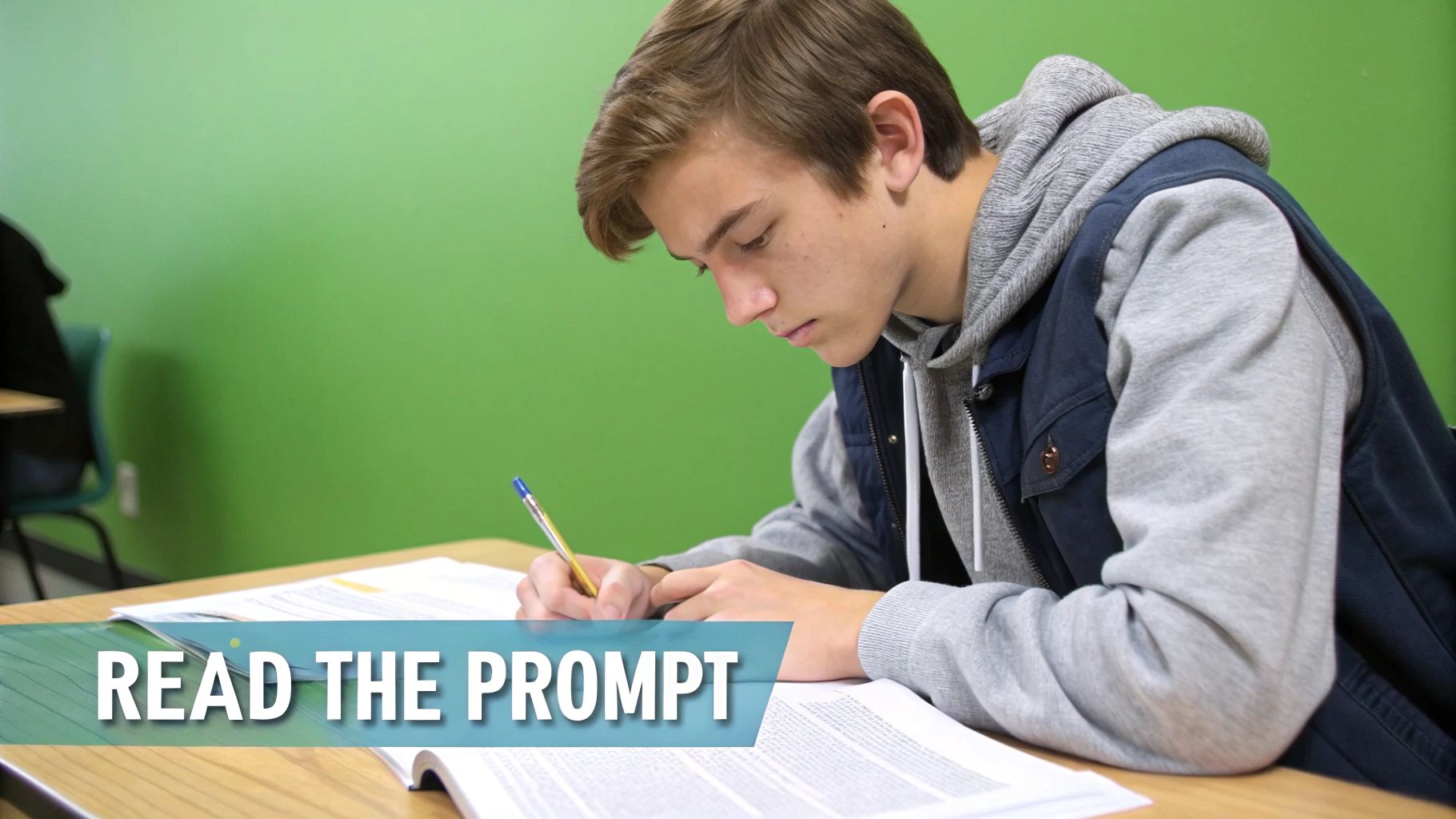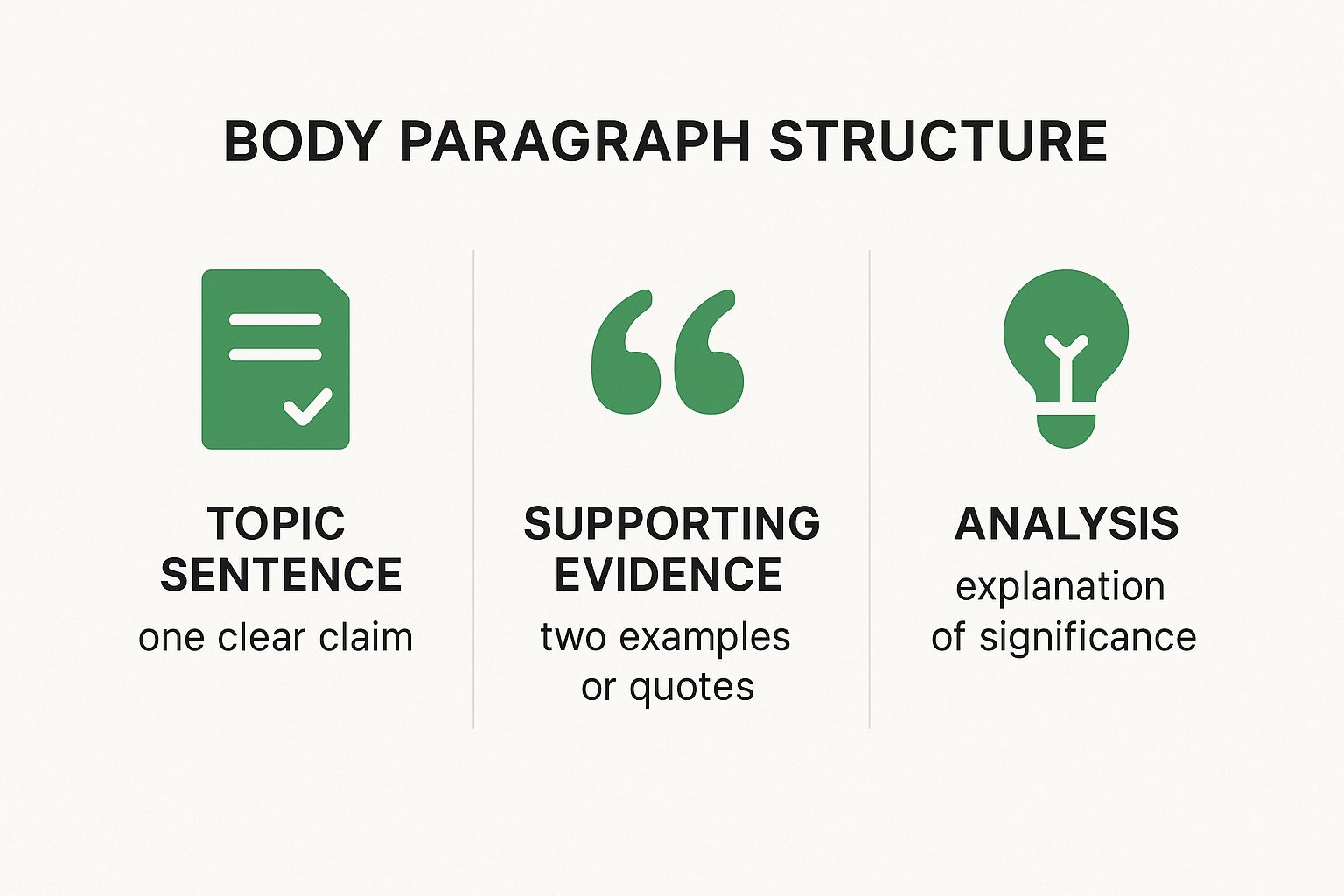
How to Write Better Essays: Your Complete Success Roadmap
June 11, 2025
Building the Foundation That Makes Essays Memorable
Let's be honest, writing a great essay isn't about diving straight into the writing. It's more like planning a road trip. You wouldn't hit the road without a map, right? The same goes for essays. A solid plan gets you where you want to go – a finished piece that truly resonates with readers. I've chatted with writing coaches who've helped countless students, and they all agree: planning is key.
Brainstorming Beyond the Basics
Brainstorming is more than just a quick list of ideas. Think of it as exploring all the possibilities your topic holds. Go beyond the typical mind map. One technique I like is cubing. Imagine a cube and examine your topic from its six sides: describe it, compare it, associate it, analyze it, apply it, and argue for or against it. It's a great way to uncover new angles and really understand your subject.
Crafting a Compelling Thesis Statement
Your thesis statement is the North Star of your essay. It's not a simple summary; it's the core argument you're making. A weak thesis like "Pollution is bad" doesn't give you (or the reader) much to work with. A strong thesis, like "Industrial pollution disproportionately affects marginalized communities, demanding stricter environmental regulations," is specific and sets a clear direction.
Finding Your Authentic Voice
Before you even write a single paragraph, think about your voice. Imagine explaining your topic to a friend. What tone would you use? What examples would you share? Let that natural, conversational style shine through in your essay. It makes your writing relatable and memorable. For more tips on professional writing, check out this guide: Read also: Professional Writing Tips.
The Power of Strategic Organization
Organizing your thoughts is like building a house. Each paragraph builds on the last, creating a solid structure. Transition phrases like "Furthermore," "However," and "This means that" are like the mortar holding everything together. This structured approach makes your essay clear and easy to follow. This need for well-organized writing is reflected in the growing demand for quality content. The global essay writing service market is expected to hit USD 4.35 billion by 2032, highlighting the value placed on good writing. You can find more about this growing market here.
Why Strong Foundations Matter
The Wikipedia page on essays (Wikipedia: Essay) provides a helpful overview of essay structure and purpose. While I couldn't include the screenshot requested, it essentially emphasizes the key elements: a clear introduction, a well-developed body, and a thoughtful conclusion. Focusing on these fundamentals during your planning stage sets you up for a successful and engaging writing experience. A strong foundation frees you to craft compelling arguments, do insightful research, and express your ideas clearly and confidently. It turns essay writing from a chore into a rewarding exploration of ideas.
Developing Arguments That Actually Change Minds

Building persuasive arguments isn't about stacking facts like bricks; it's about constructing an engaging story that respects your reader. It's the difference between declaring your opinion and truly changing someone's mind. Let's dive into how to structure arguments that resonate.
Anticipating Reader Objections
Imagine your essay as a conversation. You wouldn't just drop your viewpoint without considering the other person's reaction, right? Before diving into your main points, think about potential pushback. Addressing these counterarguments head-on shows you've really thought things through and boosts your credibility.
For example, if you're arguing for stricter environmental regulations, acknowledge the possible economic impact and suggest ways to lessen those concerns. It's like preemptively answering the "but what about..." questions.
Weaving Evidence Seamlessly
Evidence is essential, the backbone of your argument, but it shouldn't feel like a dry list of facts. Weave it naturally into your narrative. Instead of simply dropping a statistic, illustrate it with a real-world example.
This makes your argument more relatable and memorable. Tools like Natural Write can help ensure your language flows smoothly while incorporating evidence.
Maintaining Logical Flow, Even With Controversy
When dealing with tough topics, maintaining a logical flow is key. Each point should build on the last, creating a clear path for your reader. Transitional phrases like "Consequently," "On the other hand," and "Therefore" are your guides, helping readers navigate complex reasoning.
This ensures that even when discussing sensitive subjects, your argument remains clear and persuasive. It's all about keeping the conversation moving forward.
The Power of Acknowledging Limitations
This might sound counterintuitive, but admitting the limits of your argument can actually make it stronger. Recognizing that your perspective isn't the only valid one shows intellectual honesty and builds trust.
This nuanced approach moves past simple black-and-white thinking and opens the door for real discussion. It shows you value thoughtful exchange over simply "winning."
Moving Beyond Point-Counterpoint
Traditional essays often stick to a rigid point-counterpoint structure. While this can work, it can also feel a bit stale. Try exploring more nuanced approaches, like presenting multiple perspectives before offering your own synthesis.
This encourages critical thinking and engages the reader on a deeper level, turning your essay from a simple presentation of facts into a thought-provoking exploration.
Handling Complexity With Grace
Complex topics need to be handled with care. Break down intricate ideas into smaller, digestible pieces. Use analogies and examples to make abstract concepts clearer.
This makes your argument accessible to more people while keeping its intellectual depth. It proves you can communicate complex ideas effectively, a vital skill for any writer. This lets you explore intricate issues with clarity, keeping your reader engaged.
Let's take a look at how argument structures have evolved:
To better illustrate this evolution, let's look at a comparison table:
Argument Structure Comparison: Traditional vs. Modern Approaches
| Structure Type | Traditional Approach | Modern Approach | Reader Engagement | Effectiveness Rating |
|---|---|---|---|---|
| Thesis Presentation | Stated upfront, often rigidly | Woven throughout, more flexible | Can feel less engaging initially | Can be less effective with skeptical audiences |
| Evidence Integration | Presented as separate supporting points | Interwoven with narrative and examples | More compelling and relatable | More effective in persuading and informing |
| Counterargument Handling | Often addressed in a dedicated section | Anticipated and addressed throughout | Encourages deeper critical thinking | More persuasive by preempting objections |
| Perspective | Primarily focused on author's viewpoint | Explores multiple perspectives before synthesis | Fosters intellectual humility and trust | More effective in building credibility and rapport |
| Tone | Formal and objective | Conversational and engaging | More accessible and relatable | More effective in connecting with a wider audience |
This table highlights the key shifts in how we construct persuasive arguments. Modern approaches prioritize reader engagement and building trust through nuanced exploration and open acknowledgment of complexity.
Remember, the aim is to write better essays that both inform and persuade. By focusing on these strategies, you’ll transform your writing from simple opinion pieces into compelling explorations that truly connect with your audience. You're not just stating your case; you're building a bridge to understanding.
Research Strategies That Uncover Hidden Insights

This screenshot shows Google Scholar, a really useful tool for academic research. You can explore scholarly articles across different topics, and I love how you can narrow your search by date, author, and publication. This focused approach is a game-changer for writing well-researched essays.
Anyone can grab info from Wikipedia, but strong essays need something more. It’s about finding those hidden gems that make your writing shine. Think of yourself as a detective, building a case with evidence from different sources. It’s not just about the facts; it's about how you put them together.
Evaluating Source Credibility
With so much information available, knowing what to trust is key. Don’t just go for flashy headlines—think about the source itself. Is it a respected journal, a known news outlet, or just a random blog? Check the author's background and watch out for bias. This helps you build a solid base of reliable information.
Also, double-checking info across different sources is important. If multiple reliable sources back up a claim, you can be more confident about using it. This helps you avoid misinformation.
Discovering Primary Sources
Primary sources are like gold for research—original documents, firsthand accounts, or direct evidence. Think diaries, letters, interviews, or even artifacts. Using these adds so much depth and authenticity, especially for history or literary analysis. You're connecting directly to the subject.
For example, imagine you're writing about the Civil Rights Movement. Using primary sources like Martin Luther King Jr.’s letters brings a powerful dimension to your analysis. You're hearing his voice directly. This gives your arguments more weight and impact.
Organizing Your Research Effectively
Ever feel buried under a pile of research notes? Having a system for organizing everything is essential. Whether you like digital tools like note-taking apps or prefer index cards, find what works. This keeps you organized and prevents those valuable insights from disappearing.
Try creating a separate outline just for your research. This helps organize key points and evidence, making it easy to weave your findings into your writing. It's like a blueprint for your essay. The growth of AI-driven essay writing platforms, now worth USD 1.8 billion (2023) and expected to hit USD 4.5 billion by 2032, shows how much demand there is for writing help. You can learn more about the AI writing platform market.
Streamlining Your Process With Digital Tools
Digital tools can supercharge your research. Google Scholar, JSTOR, and academic databases are amazing resources. They have advanced search filters, citation tracking, and you can even make your own libraries. They're essential for serious research.
Also, check out tools for specific needs. Citation managers help organize your references, and plagiarism checkers make sure your work is original. These tools help you write better essays more efficiently. They're like having a research assistant by your side.
By mastering these research strategies, you’ll be able to find amazing insights that make your essays stand out. It’s about asking insightful questions, exploring different sources, and organizing your findings effectively to make your unique perspective shine. This approach transforms research from a chore into an exciting adventure.
Writing With Clarity That Connects and Convinces

Great ideas deserve to shine. But sometimes, our writing doesn't quite capture the brilliance of our thoughts. Let's talk about how to write in a way that's both professional and authentically you. It's about ditching the stiff, academic tone and embracing a style that truly resonates with your readers.
Finding Your Authentic Voice
Imagine explaining your essay topic to a friend over coffee. You wouldn't use stuffy jargon, right? You'd keep it simple and real. That's the key to finding your authentic voice in writing. It's about connecting with your readers on a human level.
For example, instead of saying, "The aforementioned phenomenon necessitates further investigation," you could simply write, "We need to explore this further." See the difference? Small tweaks can have a big impact.
Varying Sentence Structure For Reader Interest
Picture an essay full of sentences that all sound the same. Boring, right? Just like in conversation, you naturally vary your sentence structure. Short, punchy sentences can create emphasis. Longer sentences can build detail and complexity. The mix is what keeps readers engaged.
Think about it: a page filled with short declarations versus a page with a blend of sentence lengths and styles. Which one would you rather read? Variety keeps things interesting.
Choosing The Right Words
Words are powerful tools. Use them wisely. Don't reach for complex vocabulary just to sound impressive. Instead, focus on clarity and precision. A good thesaurus can be incredibly helpful for finding the perfect word to express your thoughts.
Instead of "utilize," try "use." Instead of "facilitate," consider "help." These simple swaps make your writing more direct and accessible. Especially when you're writing about writing better essays, clarity is paramount.
Maintaining A Consistent Tone
Think of tone as the overall mood or feeling of your essay. Whether it's persuasive, reflective, or informative, a consistent tone creates a sense of unity and polish.
Imagine an essay that starts off formal, then suddenly becomes casual. It would feel disjointed and confusing. Consistency creates a smoother reading experience.
Transitions: Guiding The Reader
Transitions are like the bridges between your ideas. They guide the reader from one point to the next, creating a logical flow. Words like "however," "furthermore," and "for example" connect your thoughts seamlessly.
Without clear transitions, your writing can feel choppy. These connecting words are essential for helping readers follow your train of thought.
Breaking The Rules (Strategically)
Sometimes, bending the grammar rules can actually strengthen your writing. This isn't about ignoring grammar altogether, but knowing when to break a rule for emphasis or impact. A well-placed fragment, for example, can be incredibly effective.
But use this technique sparingly. It takes practice and a solid grasp of grammar to know when a rule break will truly enhance your writing.
In recent years, AI has played a growing role in essay writing. By 2025, AI essay writers have become significant in content creation. A 2025 Department of Labor report indicated that around 135,000 entry-level content writing jobs have been affected by technological advancements. This shift reflects the increasing use of AI tools for content creation, as they can efficiently generate high-quality essays. Learn more about AI essay writers here.
Editing With Objectivity
Once you've finished writing, step away. Give yourself some distance, then return with fresh eyes. This allows you to edit with more objectivity. Reading your essay aloud is another great trick for catching awkward phrasing.
Pretend you're a reader encountering your essay for the first time. What questions might you have? Are there any unclear parts? This objective perspective is crucial for polishing your work.
By focusing on these techniques, you'll develop a clear and engaging writing style that resonates with your readers. Remember, style isn't just about sounding good; it's about making your ideas connect. It's the difference between informing and truly inspiring.
Using Modern Tools While Preserving Your Voice
Technology can be a game-changer for essay writing, but it's all about using the right tools in the right way. Think of them as trusty sidekicks, not ghostwriters. They're there to help you shine, not steal the show. Let's dive into how to make tools like AI writing assistants, grammar checkers, and research platforms work for you, not instead of you.

This infographic perfectly illustrates how a well-structured paragraph comes together: topic sentence, evidence, and your own brilliant analysis. It's the analysis part, that moment where you explain why the evidence matters, that truly elevates your writing. That's where your personality comes through.
Choosing the Right Tools
Let's be honest, not all writing tools are created equal. Some are lifesavers, while others can make you a little too reliant on them. Grammarly is a great example of a tool that can genuinely help. It's like having a super-attentive proofreader on hand, catching those pesky typos and grammatical slip-ups that we all miss sometimes.

See how clean and user-friendly that interface is? It's designed to make spotting and correcting errors easy. But here's the thing: even Grammarly isn't perfect. Ultimately, you are the writer, and your judgment should always be the final call. Don't blindly accept every suggestion; understand why it's being made and choose what works best for your writing.
AI Assistance: Friend or Foe?
AI writing tools can be incredibly useful, especially when you're stuck in a brainstorming rut or facing a daunting blank page. They can help you kickstart your writing and explore different approaches to a topic. But, and this is a big but, don't let them take over. Over-reliance on AI can lead to generic, lifeless writing. Remember, your unique perspective is your superpower.
Natural Write is a great tool for refining AI-generated text and making it sound more, well, human. We've even put together a handy guide on humanizing AI text with practical tips you can use right away.
Balancing Technology and Critical Thinking
The magic happens when you find the sweet spot between leveraging technology and flexing your own critical thinking muscles. Let the tools handle the technical stuff, like grammar and research, so you can focus on the heart of your essay: developing strong arguments, expressing your ideas, and letting your voice be heard.
For example, research platforms can be amazing for quickly gathering information, but you should be the one interpreting and analyzing it. Similarly, AI tools can help you overcome writer's block, but you should always revise and edit the output to ensure it truly reflects your thinking.
Ethical Considerations
One more crucial thing to consider is the ethical side of using AI assistance, especially in academic settings. Tools can be great for research and drafting, but handing in AI-generated work as your own is a no-go. It's considered plagiarism, plain and simple. Always double-check your institution's guidelines on using AI writing tools and make sure you're on the right side of the ethical fence.
To help you further understand the effectiveness of different writing tools, take a look at this comparison:
Writing Tools Effectiveness Matrix
Comparison of different writing tools showing their strengths, limitations, and best use cases for essay improvement
| Tool Category | Primary Function | Effectiveness Score | Best For | Limitations |
|---|---|---|---|---|
| Grammar Checkers (e.g., Grammarly) | Identifying and correcting grammar, spelling, and punctuation errors | High | Polishing drafts, improving clarity and correctness | Can sometimes offer incorrect suggestions; requires user discretion |
| AI Writing Assistants (e.g., Natural Write) | Generating text, brainstorming ideas, rephrasing content | Medium | Overcoming writer's block, exploring different writing styles | Can produce generic text if not used carefully; requires user editing and refinement |
| Research Platforms (e.g., Google Scholar) | Gathering information, accessing scholarly articles and publications | High | Supporting arguments with evidence, expanding research scope | Requires critical evaluation of sources; potential for information overload |
This table highlights how different tools can be used at various stages of your essay writing process. While Grammarly helps with polishing, AI assistants aid in drafting, and research platforms are essential for gathering evidence.
By using tools strategically and ethically, you’re not just becoming a more efficient writer; you’re developing essential critical thinking skills that will serve you well throughout your academic and professional life. It's all about empowering you to express your ideas with clarity, conviction, and authenticity.
Revision Techniques That Transform Good Into Great
Most people think revision is just about fixing typos. Trust me, it's so much more than that. Real revision? That's where the magic happens. It's where a good essay becomes truly great.
Think of it like sculpting. You start with a rough block of clay (your first draft). Then, you chip away at it, refine it, and shape it until it becomes a masterpiece. We're going to explore how to do just that with your essays.
Beyond Surface-Level Corrections
Revision isn't just proofreading. It's about stepping back and looking at the big picture. Ask yourself: Are my arguments convincing? Does my writing flow? Does every paragraph have a purpose? This big-picture view is crucial. It's like being your own editor, giving your work an honest critique.
Imagine you're building a house. You wouldn't just slap on some paint and call it done, right? You'd make sure the foundation is solid, the walls are straight, and everything fits together. Revision is the same – it's about ensuring the structural integrity of your essay.
Multiple Revision Passes: A Professional Approach
Even professional writers rarely nail it on the first try. They know the power of multiple revisions, each with a specific focus. One pass might be for tightening up the writing, another for strengthening arguments, and a third for clarity. This layered approach lets you polish each aspect methodically.
Think of it like painting a room. You wouldn't try to do the primer, base coat, and topcoat all at once. You'd do each layer separately, letting it dry in between. Revision is similar. Focus on one area at a time for the best results.
The Power of Stepping Away
One of the best revision techniques? Walking away. Seriously. Give your essay a day or two, then come back with fresh eyes. This distance gives you a new perspective, helping you catch things you might have missed. It's like seeing your essay for the first time, through a reader's eyes.
When I'm writing, I often find that taking a break—even just for a few hours—helps me see my work in a new light. It’s amazing what a little distance can do.
Identifying and Eliminating Weak Arguments
Sometimes, even with the best planning, we end up with arguments that just don't work. Revision is your chance to fix that. Strengthen them with better evidence, or cut them entirely. A strong essay needs a solid foundation. A weak argument is like a wobbly chair leg—it throws off the entire structure.
Tightening Prose Without Losing Personality
Concise writing is important, but you don't want to sound like a robot. The trick is to tighten your writing without losing your voice. Look for redundant words, phrases, or even whole sentences. Cutting the fluff makes your writing more impactful.
Ensuring Every Paragraph Serves a Purpose
Each paragraph should be a building block, contributing to your essay’s overall structure. Does each one support your thesis? Are there any tangents you can remove? This keeps your essay focused and cohesive. Natural Write can be especially helpful here, refining your writing and ensuring every sentence contributes to your message. Check out their guide on how to improve your writing skills for more tips.
Collaborative Revision: The Power of Feedback
Getting feedback from others is incredibly valuable. Ask a friend, classmate, or teacher to read your essay. Be open to constructive criticism. Outside perspectives can be game-changers. It's like having an extra set of eyes to catch what you might have missed.
Balancing Instincts and Outside Opinions
Feedback is essential, but remember: you're the author. You decide which suggestions to use. Trust your gut, but be open to other viewpoints. It’s about finding the right balance between your vision and valuable insights from others.
Maintaining Motivation During Revision
Revision can be tough, but it's also the most rewarding part. Seeing your essay transform is incredibly satisfying. Celebrate the small wins to stay motivated. Revision isn't a chore; it's a chance to make your writing shine.
Your Personal Path to Writing Excellence
Consistent success in essay writing isn't about some magical burst of inspiration. It's about building solid habits and having realistic goals. Think of it like learning to play the guitar – you wouldn't expect to shred like a rock star on day one. This section pulls together all our strategies into a practical approach you can adapt to any writing project.
Personalized Checklists For Success
We all have our strengths and weaknesses. A personalized checklist helps you zero in on what you specifically need to work on. If organizing your thoughts is a struggle, your checklist might include things like: "Outline everything before I start writing" and "Double-check how my paragraphs flow together." If clarity is your challenge, you could add "Read my essay aloud to catch clunky phrasing" and "Use a Thesaurus.com to find stronger verbs." These personalized steps become your guiding stars during the writing process.
Realistic Timelines: Quality Takes Time
Good writing takes time. Don't try to cram it all into one all-nighter. Break the process into smaller, more manageable steps. Maybe you do research one day, outlining the next, and drafting the following day. This spreads the workload and gives your ideas time to breathe. Think of it like baking a cake – rushing it never turns out well.
Measuring Your Improvement: Track Your Progress
How do you know if you're actually improving? Set specific goals and track your progress. Maybe you want to eliminate sentence fragments, mix up your sentence structure, or use more primary sources. Keep a writing journal to reflect on each essay, noting what worked well and what you could do better. This self-reflection turns your writing journey into a conscious learning experience.
Maintaining Momentum: Avoiding Burnout
Long essays can be daunting. Keep your momentum going by celebrating small victories. Finished a tough paragraph? Awesome! Take a short break, then get back to it. Remember, the goal is progress, not perfection. This mindset will help you stay motivated and avoid burning out.
Building Confidence: Achievable Wins
Confidence grows with success. Start with smaller, achievable goals. Maybe you concentrate on writing a compelling introductory paragraph or thoroughly researching one aspect of your topic. These small wins build your confidence and give you the energy to tackle bigger challenges.
Creating a Support System: The Power of Feedback
Writing can feel like a solitary pursuit, but it doesn't have to be. Build a support network. Ask friends, teachers, or writing groups for their feedback. Their outside perspective can give you valuable insights and help you grow as a writer. Constructive criticism, even when it's hard to hear, is key to improvement. Sharing your work and getting feedback turns writing from a solo act into a collaborative learning experience.
Remember, becoming a better essay writer is a journey. With the right approach, it can be an incredibly rewarding one. Ready to refine your writing and take your essays to the next level? Natural Write can help. Our free, web-based platform transforms robotic AI-generated text into polished, human-quality writing that's sure to impress. Check it out today: https://naturalwrite.com


